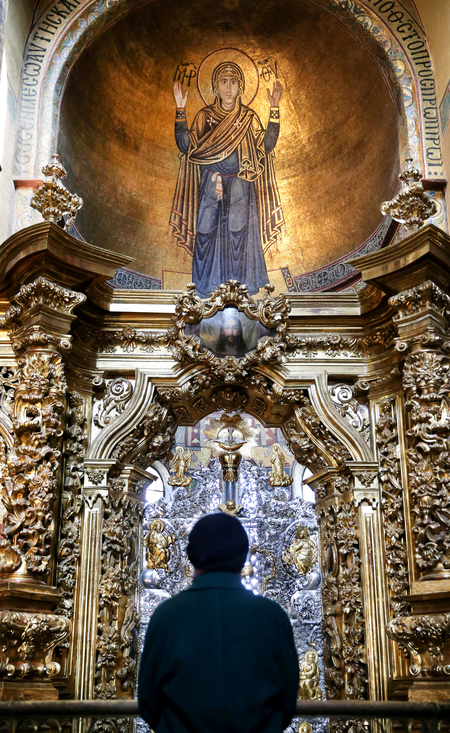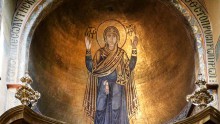It is planned to call the Orthodox Council in June 2016 in Crete. The last such council was last called a thousand years ago. This fact shows the uniqueness of the mentioned event. Indeed, Orthodoxy in general and the modern world have reached certain points in profound problems. However, it seems this Council will not be a problem-solving tool, but will merely possess representative air of unity in the Orthodox world. It should also be mentioned that Patriarch Kirill of Moscow managed to change the location of the Council, and it will not take place in Constantinople, which has historically been recognized as the second Rome. Of course, the reason for that is an escalated situation in relations between Russia and Turkey, which proves the existence of geopolitics’ significant influence on religious world.
And this is quite an alarming sign, because the Russian Orthodox Church openly demonstrates its influence in international relations, which is the Kremlin’s influence. As regards Ukraine, Kirill managed to succeed at Bartholomew recognizing Onufrii as a representative of the “united canonical church in Ukraine.” In order to do this, Kirill brought Onufrii to Chambesy (Switzerland), and even delivered a fiery speech, in which he falsely described the alleged persecutions the Moscow Patriarchate experiences in Ukraine, and therefore, there can be no dialog with the Kyiv Patriarchate of the Ukrainian Orthodox Church. As a reminder, an emergency meeting was held in Chambesy by the Ecumenical Patriarch, aimed at saving the Council.

Photo by Ruslan KANIUKA, The Day
Russian Orthodox Church has never recognized independent Ukrainian Church, just like the Kremlin has never viewed Ukraine as an independent country. Unfortunately, the Moscow Patriarchate in Ukraine becomes more of a “religious department” of Russian intelligence agencies, which prepared the background for the war in Ukraine and implements further escalation through souls and minds of believers. Here is a vivid example: archimandrite Kalinnik (Chernyshov) has been ordinated as a bishop of the Moscow Patriarchate in Kyiv. This clergyman participated in Russia’s annexation of Crimea with weapon in his hands. This is the case when a phrase “an army of priests” is absolutely literal, and a priest’s word becomes a real bullet, which brings blood and death. But unfortunately, this fact will not be considered at the Council. But without the emphasis on the sphere of activity of the Russian Orthodox Church’s and Moscow Patriarchate in particular, fraternization of priests in front of TV cameras with appeals to historical significance and declarative unity is only a sin of slyness.
COMMENTARIES
Liudmyla FYLYPOVYCH, head of history of religion and religious studies, Ph.D. in Philosophy, professor at Hryhorii Skovoroda Institute of Philosophy, National Academy of Sciences of Ukraine:
“When considering the topic of the Council, political aspect should be viewed among others. That is, the deterioration of relations between Russia and Turkey. Allegedly, this situation is in our favor. But unfortunately, there is no one to believe now. Moscow’s position remains the same: it will never agree to Ukraine having an independent church. If Moscow could agree to this, it would have done it 25 years ago, when the decree on autonomy was submitted. There are no prospects in this area at the moment. But the situation should be viewed not from Istanbul’s, that is, from Constantinople’s perspective, and not from Moscow’s, but from our own one. Therefore, we must carry out our own policy and develop our own strategy according to Ukraine’s needs.
“I am convinced that we will have local Ukrainian Orthodox Church. It is a matter of time. It may happen as a result of this Council, which is to take place in June, or thanks to the decree, which we will receive from the Ecumenical Patriarch, or as a result of a corresponding decision of our state, as it happened once in the Roman Empire and Muscovy. We must involve and actively cooperate with people who are experts in intricacies of this matter, like it is done in Greece or Moscow. History is not just life of one person or one generation. It is a continuous process. That is why we must be patient and at the same time persistent and consistent in defending our position, which is that we have a single Ukrainian Orthodox local church. This church has to unite everyone willing to accept common integration and those who understand that if there is a state of Ukraine, there must be Ukrainian Church as well.
“There should also be awareness that our parent church is not the Moscow’s, but Byzantine church. That is why we can expect this decree from the Patriarch of Constantinople only. Unfortunately, Bartholomew is too cautious. I don’t understand why everyone is so scared of Moscow. Will Kirill drop a nuclear bomb on them or on us? He complains about us abroad, he doesn’t recognize our church. So what? A common religious old lady treats her neighbor better than Kirill treats Bartholomew.
“Our Ukrainian Church has been recognized by the people. We need to be aware that this question should be settled on the level of consciousness of a specific orthodox believer and corresponding parishes. If a person loves God and Ukraine, the answer is unambiguous: Ukraine should have its own church, where the service is held in Ukrainian, where Ukrainian saints are honored.
“I have little hope in the effectiveness of this Orthodox Council. They have been sitting and talking for 50 years, but in the end, is there at least one final document? Let’s compare it to the Vatican Council, when a huge number of various declarations, charters, requests were approved, according to which Catholic Church has been living for the last half of the century. And where are relevant results of the intellectual work of Orthodox churches? These fundamental questions are the same for all churches, not only for the Catholic ones. Hence a question arises: where is Orthodoxy? Each year it loses believers. So what, if these clergymen embrace each other and serve a united oblation?”
Yevstratii ZORIA, archbishop of Chernihiv and Nizhyn, secretary of the Holy Synode of Ukrainian Orthodox Church (Kyiv Patriarchate), head of the information department of Kyiv Patriarchy:
“There are 14 mutually recognized autocephalous churches. Ukrainian Church is not on the list of those, which mutually recognize each other as autocephalous. Therefore unfortunately, Ukrainian Church will not be represented at this Orthodox Council. The Patriarch of Moscow can bring his bishops from Ukraine, that is Moscow Patriarchate archbishops who serve in Ukraine, but it is the same as Metropolitan Onufrii being present at the meeting of Church leaders in Chambesy. He was there not as a primate of the Ukrainian Orthodox Church, but as a bishop of the Moscow Patriarchate. Unfortunately, Ukrainian Church in Pan-Orthodox context is not a subject, but an object of relations of other churches. That is, other churches settle their own matters at the expense of Ukraine. This is one of the problems. Another example of strange attitude towards inter-church relations is that the Moscow Patriarchate was deeply worried that the Orthodox Church of the Czech Lands and Slovakia, which includes about 200,000 believers, does not participate in the process of preparation for the Orthodox Council. Meanwhile, the fact that Ukrainian Orthodox Church with 25 to 30 million of believers does not play a similar role in the preparation, did not disturb Moscow in the slightest degree.
“We should understand what this Council is. It is not ecumenical in any sense. Ecumenical Councils were convened to address major theological issues of the time. But at the upcoming Council no such serious issues will be settled. That is, many view this Council as an attempt to launch a new mechanism of interaction between Orthodox Churches. According to canons, bishops in each local church must meet at least twice a year to discuss various church affairs. This is a canonical norm. It is the case for local churches, but there has been no such mechanism on the level of all churches. That is, on the one hand, it was declared that Orthodox Church is united, but in reality, each Orthodox Church was on its own. This is also done to strengthen the position of Bartholomew. With the help of the Russian state, the Moscow Patriarchate lately has acted according to the ‘divide and conquer’ principle. That is why such Council is undoubtedly a positive phenomenon, since it is an attempt to restore regular order of relations between Orthodox Churches, rather than the one the Moscow Patriarchate is trying to impose.
“But I agree that Russia as a state has always viewed Orthodoxy as a tool of influence. This is not happening only now, it has been like this during the Soviet times, when the state was officially atheist, but religious structures have been used to spread the state’s influence, particularly in the Middle East. It is no secret that the bishops of the Antioch Orthodox Church received salaries from Moscow. So, there really is a danger that Russia will try to use this Council to carry out decisions that would be favorable for its aggressive policy against Ukraine.”








